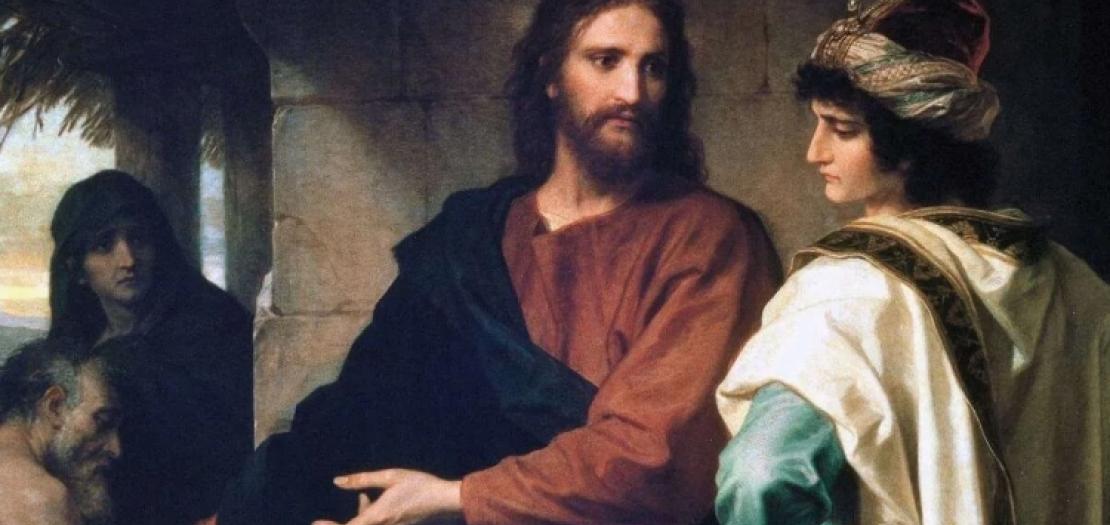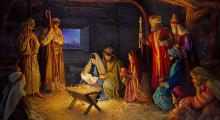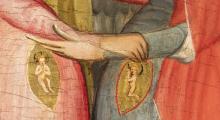Issued by the Catholic Center for Studies and Media - Jordan. Editor-in-chief Fr. Rif'at Bader - موقع أبونا abouna.org

Following is the text of meditation by Cardinal Pierbattista Pizzaballa, Latin Patriarch of Jerusalem for the 28th Sunday of ordinary time, dated October 13, 2024:
Today's Gospel passage (Mark 10:17-30) recounts an encounter of a person who ran to Jesus, as he was setting out, and sought to dialogue with him.
Let us consider the outcome of this encounter: “...his face fell, and he went away sad,” (Mark 10:22): The outcome, then, is sadness.
But why does the encounter between Jesus and this fellow end like this?
We are used to thinking that our sadness depends on something we lack: we deceive ourselves by thinking that if we have enough of what we desire, we will be happy.
This is precisely the serpent’s deceit described in the story of original sin. (Gen. 3)
The serpent deceived Eve and Adam by making them believe that for them to be happy and truly be alive, they must possess everything without any limits; there can be nothing that is forbidden to them, and they must not lack.
The serpent's cunning lies precisely in making what we lack seem essential and irreplaceable for our happiness and fulfillment in life.
Thus, the result of sin is the inability to find joy in what we already possess, leaving us perpetually longing for something else, for what we lack, trapped in an endless cycle of pursuing new accomplishments as life passes by. For Jesus, life is exactly the opposite.
When the man asks Jesus what he must do to inherit eternal life, Jesus responds by pointing out that he is indeed lacking in one thing: "You are lacking in one thing. Go, sell what you have, and give to the poor, and you will have treasure in heaven; then come, follow me." (Mark 10:21)
However, what he lacks isn't an additional possession but rather a relationship to embrace and the ability to create space for it.
This is what the Lord offers this person: a relationship in which he feels looked upon and loved not because of what one does, nor possesses, but because of an original gift that is given to us before any possible response (“…looking at him, loved him...” (Mark 10:21)
It presents him with the opportunity to liberate himself from the serpent's deception, which suggests that our possessions grant us life instead of recognizing that it is our relationship with the Lord—who is the only true good ("No one is good except God alone" (Mark 10:18)— he is goodness itself.
But why does this man not accept this gift of life? What is the difference between him and others who, in the Gospel, encountered the Lord and found salvation?
The distinction may be that those individuals allow themselves to be transformed; they accept the risk of making changes in their lives and are willing to take a chance by putting themselves on the line for Jesus, even if it means making sacrifices and letting go of certain things. In the Gospel stories, we see that everyone who encounters the Lord changes their ways, changes their lives, and adopts a new way of living.
This man, however, returns the same way he came, unchanged. This is a second deception, into which we all often fall.
We think that our lives can improve and become more beautiful and fulfilling without anything in us changing, without taking the necessary steps and making the effort to let go of everything that keeps our hearts bound.
Jesus, in contrast, is the One who, out of love for us, left something behind, becoming poor, lacking, and limited; He made room within himself to embrace our humanity.
The response to this love can only be in this way: to love means allowing ourselves to be transformed by another person and to let that person become our treasure.
To human eyes, this may appear impossible, and perhaps it truly is unattainable from a human perspective. However, God can make it happen within us ("For human beings it is impossible, but not for God. All things are possible for God." (Mark 10:27)
Indeed, this represents the final, essential step in embracing this new life: recognizing that it is not by our strength or ability, but rather a gift from God. It is He who first acted on our behalf, humbling Himself to love us and sacrificing Himself to dwell within us.
It is not about earning extra merit; otherwise, we would still be caught up in the mindset of merit and possession, similar to the man who left feeling sad. What we can do is cultivate a sense of wonder that opens us up to God's gift, allowing ourselves to be seen through His loving gaze, which alone can show us what we truly lack.
+Pierbattista







